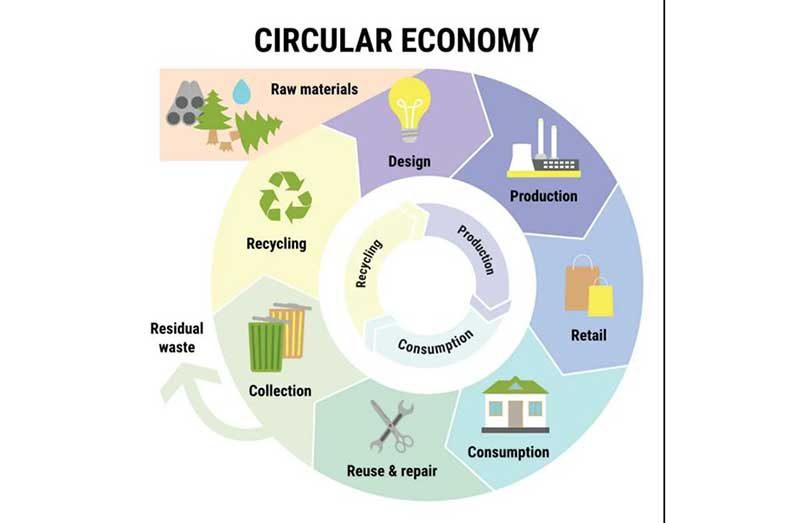AT the United Nations Climate Change Conference (COP29) in Baku, Azerbaijan, Multilateral Development Banks (MDBs) presented their first joint report on the circular economy: “The Circular Economy in Motion”.
The report presents 20 detailed case studies from around the world and a variety of areas ranging from waste management and food to the construction sector, plastics, textiles, battery recycling and the recovery of critical raw materials. The case studies provide a snapshot of the MDBs’ support to the
circular economy that spans advisory services, financial support to governments, private-sector investments and backing to the financial sector.
Drawing on the case studies, the report provides six key insights: Far from being limited to high-income countries, circular economy investments are gaining ground globally, including in middle- and low-income countries, despite an uneven policy framework; As a group, MDBs provide a wide range of products to develop and support the circular economy from tailored loans and investments to advisory support; The private sector is actively engaging in circularity, but a more conducive regulatory framework is needed to take full advantage of the opportunities of the circular economy; Cities can incubate innovation and drive action; The financial sector plays a crucial role in improving access to finance for circular businesses, but needs guidance on how to seize this opportunity; and Circular economy interventions by the MDBs must actively involve and support the most vulnerable populations and the informal sector.
“The Inter-American Development Bank is committed to fostering sustainable development through innovative circular economy investments. Our case studies highlight the transformative impact of these initiatives, showcasing how strategic investments can turn waste into valuable resources, drive economic growth, and promote environmental sustainability” said Sergio I. Campos G., Water and Sanitation Division Chief at the Inter-American Development Bank.
“The financial sector is pivotal in driving the transition to a circular economy by channelling investments and creating innovative financial instruments that support circular business models and solutions focused on resource efficiency, waste reduction, and smart design,” said Gabriel Azevedo, Chief Strategy Officer of IDB Invest. “Embracing a circular economy not only unlocks business opportunities for sustainable and inclusive growth but also plays a significant role in addressing the climate crisis.”
“The African Development Bank acknowledges the transformative potential of circular economy to generate youth employment and ecological benefits through regenerative practices and efficient resource use. Through the Africa Circular Economy Facility (ACEF), the Bank is committed to continue to
empower African countries to harness the numerous opportunities of the transition to circularity”, emphasised Dr Anthony Nyong, Director for Climate Change and Green Growth at the African Development Bank.
“The circular economy provides a useful framework and holistic solutions in tackling the triple planetary crises of biodiversity loss, pollution, and climate change,” said Yoko Watanabe, Environment Director for ADB’s Climate Change and Sustainable Development Department. “ADB’s Environment Action Plan, which is being released during COP29, sets the roadmap for scaling up nature-positive investments, including actions related to promoting the circular economy in Asia and the Pacific.”
“This report is a testament to the growing collaboration among MDBs, now extending into the circular economy,” said Gianpiero Nacci, Director of Sustainable Business and Infrastructure at the EBRD. “As a group, we aim to help businesses reduce waste, enhance resource efficiency, and build resilient supply chains. At the EBRD, we are committed to driving innovation in circular solutions across our regions.”
“The circular economy represents a powerful shift, enabling growth within our planet’s limits,” said Ambroise Fayolle, EIB vice-president responsible for financing environment, climate action and the circular economy. “It calls for bold partnerships and shared knowledge to drive and scale up impactful solutions. As the European Union’s climate bank, the EIB is committed to stepping up its support for investments worldwide in climate action, environmental sustainability and the circular economy.”
“The effects of climate change, nature loss, and pollution are being felt first and foremost by developing countries. We can no longer maintain a livable planet with linear economies that grow now and clean up later. Moving toward more circular approaches can support jobs and competitiveness for
countries – but this requires better regulations. The circular economy presents enormous opportunity for the private sector. Multilateral Development Banks can play a key role in supporting countries to create the right policy environment to attract private sector investments that seize the opportunities that a circular economy offers,” said Valerie Hickey, Global Director for Environment, World Bank.
In their shared vision presented at the World Circular Economy Forum in Brussels in April earlier this year, the MDBs’ Working Group committed to promoting the exchange of knowledge with the private sector, civil society, and local, regional and national authorities. The members of the MDB Working Group are: the Asian Development Bank (ADB), the African Development Bank (AfDB), the European Bank for Reconstruction and Development (EBRD), the European Investment Bank (EIB), the Inter-American Development Bank and IDB Invest, and the World Bank Group (World Bank and IFC).



.jpg)









